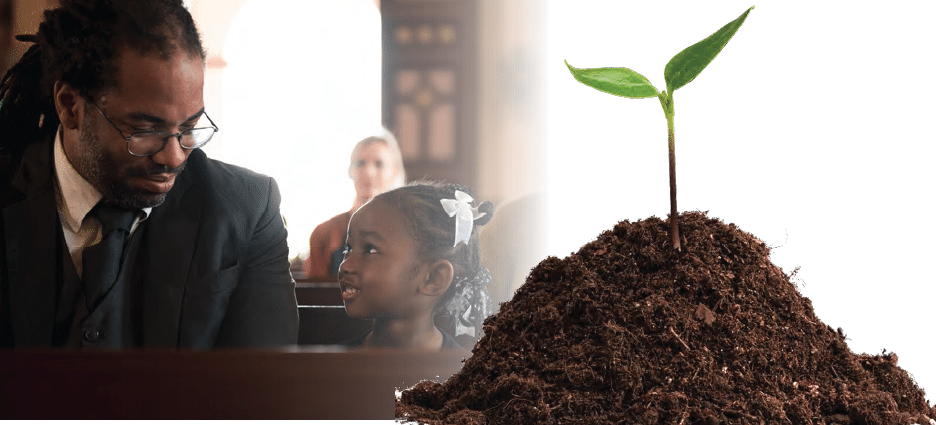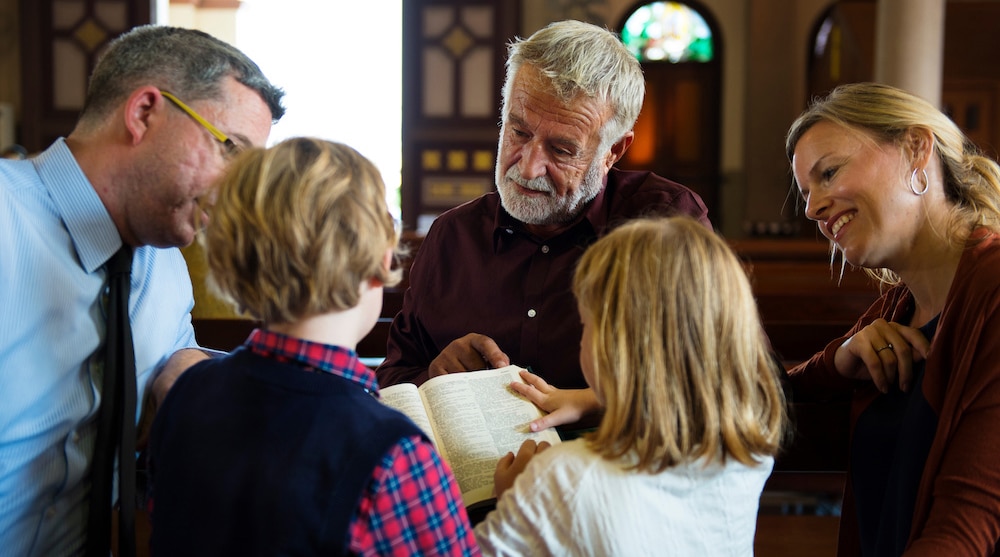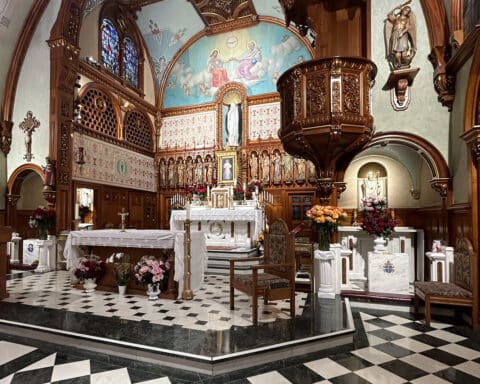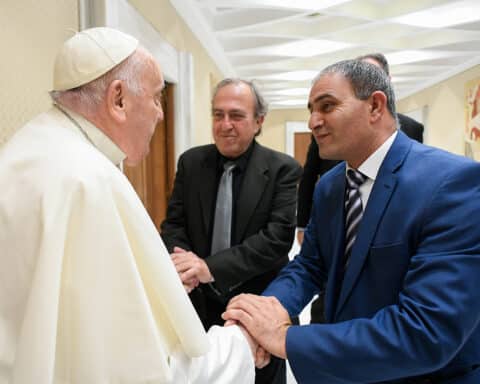Look around at our society today and it’s clear that the world needs good fathers. But what does good fatherhood look like? Over my years as a dad, and through the example of the fathers in my own life, I’ve come to see the different stages of fatherhood and what is needed to raise our children after the model of God the Father.
As we prepare to celebrate Father’s Day, here are some reflections on the important roles that fathers play in the life of their children.

A provider
The first couple years of fatherhood is this glorious self-martyrdom of our desires. It changes a man. He stops thinking about his needs and focuses on providing for this new dependent child. The feeling that overcame you in the hospital manifests into this instinct to provide natural goods for the child.
I remember vividly getting up in the middle of the night, still half asleep, stumbling from my bed to the crib to ensure my son was still breathing. Intellectually, I knew he was still breathing, but I wanted to double check, even if that meant losing yet another hour of sleep.
As the baby grew and transitioned to baby food, after many hours at the dinner table trying to get him to eat all his food, I became an all-star at getting him to eat his veggies by spiraling the spoonful into his mouth while making a helicopter noise. And in a blink of an eye, my son outgrew the bedside crib I meticulously built for him a year earlier and made the transition into his nursery.
While providing these natural necessities of life, food and shelter came naturally, it did not come without a cost. I intentionally and happily gave up my time and desires for the greater good of raising this child.
A teacher
As my toddler was visibly changing and developing, I realized my role as a father was changing and developing, too. I had provided the necessities for my son to grow, and I recognized my duties were not just to provide but to create an atmosphere for him to thrive.
This foundation to flourish is built on virtue, as “virtue is the utmost of what a man can be; it is the realization of the human capacity for being,” as Josef Pieper wrote in “A Brief Reader on the Virtues of the Human Heart.” As many great teachers have taught us, virtue is formed not by a single good act but by doing the good act habitually. Habits are not easy to form, especially with a child in the throes of “terrible twos,” so I decided to start with the easy task of how we speak to one another.
These moments of teaching my child to grow in virtue ironically became moments of self-reflection on how I have either fallen short or become apathetic in my path of growing in virtue.
“In the beginning was the Word” (Jn 1:1). Let us start there, as language sets the tone for building a culture “where tenderness, forgiveness, respect, fidelity, and disinterested service are the rule” (Catechism of the Catholic Church, No. 2223). I taught my son the importance of good and holy language, the virtues of respect and piety, by starting with this very simple task of using “please,” “thank you,” “yes ma’am/no ma’am,” and “yes sir/no sir.” Ironically, as I was teaching him to use his manners, it quickly revealed some of my shortcomings. “Did I thank my wife for dinner this evening?” I thought as I was teaching my son to be thankful for his dinner.
Teaching my child how to talk was not the only factor. Training him when to talk also became important. As every parent knows, silence is not a child’s natural disposition. Yet, there are many times in a child’s life when they need to know when to be quiet. I looked for creative ways to cultivate silence in the home. “After dinner tonight, we will have five minutes of quiet playtime,” I told my son at the dinner table. We would quietly build spaceships out of Legos together, or I would read him his favorite book while he sat silently listening. My goal was to get him comfortable with being quiet so that it would translate on Sundays. A child does not learn to be silent at holy Mass; he learns to be silent in the home and then exercises that learned skill at holy Mass. We cannot expect a child to learn how to be still and quiet with only one hour a week of practice.
Again, teaching this habit was self-reflecting. How many times did I grab my phone in moments of silence? Am I making time throughout my day to grow in the virtue of silence, or am I constantly filling my day with noise? These moments of teaching my child to grow in virtue ironically became moments of self-reflection on how I have either fallen short or become apathetic in my path of growing in virtue.

An establisher
As time went on, my son was coming to the age of reason, and it was my job to establish him, making him a disciple of Christ, so that one day he could go out into the world to spread the Good News.
When I think about establishing my son, I think about being able to create or pass on things that will live beyond myself. I do not want my son’s decision-making process to be contingent on my presence. The catechism says, “This requires an apprenticeship in self-denial, sound judgment, and self-mastery” (No. 2223). How is this done? How am I supposed to establish my children to go out into this crazy upside-down world?
Establishing a routine of living a sacramental life is the first focus. What do Sundays look like in our house? Does it look like every other day? Or is this day set apart (or sacred) from all the other days? “What exactly is Christian culture? Well, it is essentially the [Holy] Mass,” wrote John Senior in “Restoration of Christian Culture.” Sundays and holy days of obligation must be filled with joy and rest. Joy is a response when we receive what we love. And at holy Mass, we receive the body, blood, soul and divinity of Our Lord, Jesus Christ. As a Catholic, there is no greater reason to celebrate with family and friends. Sundays should not be another day to get more work done; it should be a day of rest and feasting. This naturally establishes traditions within the family and community that can be passed down to future generations.
As a father, how I live will uniquely impact how my sons and daughter perceive how a man should live his life. I want them to know that a real father needs the mercy and forgiveness of Jesus.
Likewise, a regular habit of going to confession as a family is important. Just as many games, celebrations and important events are scheduled on the calendar, so, too, should going together as a family to the Sacrament of Reconciliation. As a father, how I live will uniquely impact how my sons and daughter perceive how a man should live his life. I want them to know that a real father needs the mercy and forgiveness of Jesus. Pope St. John Paul II affirmed this, saying that a father “introduces the children into the living experience of Christ and the Church” (Familiaris Consortio, No. 25).
Analogous to teaching our children, as we establish our children, we establish ourselves. It is the phase in fatherhood where we are finally becoming the man we want to be. A father that is more than just a provider of natural necessities and a teacher of natural virtues, but a role model for living a true, authentic Christian life.
| 5 Ways to Increase Your Prayer Life |
|---|
|
An intercessor
Contrary to what the culture might say, fatherhood does not end once the child leaves the home. While the father’s role and influence might change, his role is nevertheless important. He must pray that the child, now a young adult, surrounds themselves with good, holy and virtuous people. As St. Paul warns, do not be deceived: “Bad company corrupts good morals” (1 Cor 15:33). It is not enough for us to raise our children to be morally sound; if they do not have a good community around them, the foundations that were built can crumble. So, the lens should be widened to see beyond just the child. The father can no longer afford to be laser-focused on the present but has to have the foresight to be praying for his child’s friends, community and even their future spouse.

Custodian of tradition
“May they be blessed with children, and prove themselves virtuous parents, who live to see their children’s children.” This line in the Nuptial Blessing takes place after a couple’s vows and the exchanging of wedding rings. And is this not what every man wants? To see their children be blessed with the gift of children?
The fullness of fatherhood is reached when a man becomes a grandfather. As the young father matures from the natural concerns of the baby, to teaching morality to the child, to interceding for the child as a young adult and starting his own family, he arrives at a unique spot in grand-fatherhood. The son he has established has gone out into the world and has now come back to share his life with his father. Comically, he has even started making some of the same jokes or using the same sayings as his father. His son, after spending time and seeing how a man should act, has become more and more like his father. The grandfather sees the family he and his wife have created and knows that it is good. With his mortality ever present, he is less concerned about the busyness of the day-to-day but has a unique perspective on what should be of most importance. And with this vision, he wants to guard and preserve the good things he has established in this life.
The grandfather sees the family he and his wife have created and knows that it is good. With his mortality ever present, he is less concerned about the busyness of the day-to-day but has a unique perspective on what should be of most importance.
My grandfather, alongside my grandmother, would take a moment to address the family when we got together for holidays or birthday celebrations. He would sit down in front of the fireplace expressing the love he had for us and sharing a little wisdom. “You can never go wrong with doing what is right,” he would always conclude his address. He would remind us of the importance of spending time together, supporting one another, living a life of prayer, and making sure to pass on the Faith to the next generation. He was acutely aware that these family traditions were the foundations for us to thrive, and he guarded them until the day he entered into his eternal reward.

The spiritual life
As I look back on this cycle of fatherhood, I realize how many parallels there are to the spiritual life. God the Father, the Creator of all things, invites us as fathers to participate in his creation and share in his very name. He gives us this vocation (vocare in Latin, meaning “to call”) to summon us to be more like him through our vocation of fatherhood. (St. Paul has a great line on this, that we call all fathers father because of God the Father.) This calling is to be accepted with the knowledge of “Thy will be done” not “my will be done.”
| A prayer for protection of the children in temptation |
|---|
|
O God, to how many and great temptations of body and soul are my children exposed! And how insufficient is the protection I can give them. Yes, Lord, “In vain I watch over them if thou dost not assist me.” But if they dwell “in the aid of the Most High, and abide under the protection of the God of Jacob,” how contented may I not be! Receive then, O Lord, my children, under thy protection. Keep them far from all dangers of soul and body; give them health. But above all protect them from danger to their souls. Keep far from them all that may exercise a hurtful influence on their young hearts and become an occasion of sin to them. Preserve them from sin. Send “thy holy angels to keep them in all their ways that they may bear them up in their hands, lest they dash their feet against a stone.” O Almighty God and Father, lead my children through the dangers and storms of this life, that they may enter safely into the haven of salvation. Amen. Source: Rev. L. A. Lambert, “The Christian Father: What he should be, and what he should do” |
As fatherhood requires us to make certain sacrifices, likewise, so does entering into a life of prayer. We must change our daily routines and give up selfish desires for the greatest good, namely, developing a relationship with Jesus Christ. Spending time with Christ every day will not only change how we view the world but how we view ourselves. He slowly reveals to us our true selves, bringing to light imperfections that may have been hidden and reminding us of the constant need for conversion. It is in prayer that he will not only teach us how to talk but when to talk. While the early stages of the prayer life can be dominated by our prayer requests to him, it is in silent prayer where the heart of Jesus speaks to us. In this silence, he establishes us with grace to live a virtuous life, forming habits oriented to the true, the good and the beautiful. This grace tames our unruly appetites allowing our attention to be focused more on the needs of others rather than ourselves. As we continue interceding for others, our lens widens, seeing the power of prayer and the work of Christ not only in our own lives, but in our family, friends, and community. Our Lord continues to draw us closer to him to the point where “there is nothing but calm, repose, silent contemplation, and adoration of the radiant face of God,” as Cardinal Robert Sarah wrote in “The Power of Silence.” In this contemplation, a transformation occurs. As the grandfather witnesses his children becoming more and more like him, so, too, does the heavenly Father see his children becoming more like him.
To be a truly good Christian father, you must be a man of prayer. It is a necessary requisite to the vocation. The goal of a Christian father is to raise saints, and by his grace, one day on your deathbed, your children will express their gratitude that their father’s love gave them a glimpse of the Father’s love.





